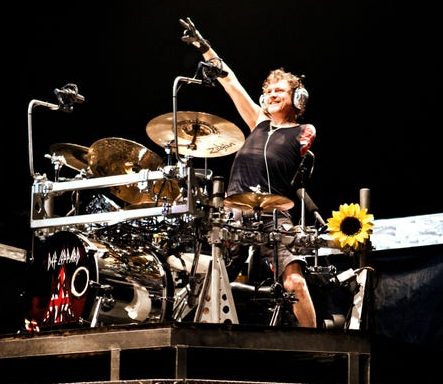Combining Soundgarden’s post-modern heavy metal attack with the classic, southern rock song craft of The Allman Brothers, Blackstone Cherry have arrived from south central Kentucky to give hard rock a serious kick in the ass. Since the summer 2006 release of its self titled debut, this quartet of high school friends has been on the road nearly non-stop with rock heavyweights such as Buckcherry, Staind and Black Label Society, winning diehard converts at every venue. “You can sit here and talk about it,” says 21-year old drummer John Fred Young, “but when people see us live they go, ‘Oh my god, this band’s the real thing.’” Raised on the music of ‘70s legends like Aerosmith and Led Zeppelin, John Fred is actually part of country rock legacy: his father Richard and Uncle Fred are guitarist and drummer, respectively, for the Grammy award-wining band The Kentucky Headhunters. “My uncle Fred got me a kit of drums when I was five years old,” he explains. “Besides John Bonham, he is definitely my biggest influence.” With more tours booked and the album still selling well, 2007 looks like another great year for this talented band of southern rockers, as John Fred confesses, “I think Blackstone Cherry is really just at the very beginning of where we’re going to go.”
Metal Edge: When recording the album, did you come up against any challenges in the studio?
John Fred Young: There were some challenging songs, because we don’t play with a click track, so everything – including the drums – is cut live. We just go back, do the vocals and add maybe a couple of guitar overdubs. It’s kind of like back in the day when Ray Charles was making albums: you just do it in one take. When you make albums in that manner I feel like they come off so much more from the heart.
Metal Edge: What songs are your favorites to play live?
John Fred Young: I think one of the funnest songs to play live is probably “Drive.” It’s such a high-octane groove that’s just in-your-face, and on the last part of the drums it goes a little berserk. One of the biggest compliments I’ve gotten about the record is when kids ask me ‘What kind of double kick pedal do you use?’ And I’ll say, ‘It’s an invisible one, because I use a single pedal’ (laughs). That’s a cool compliment. I guess [my footwork] comes from listening to my uncle Fred and Bonham play. I like doing a lot of fast footwork, but I’m definitely a better fisherman (laughs).
Metal Edge: With your fast footwork, did you previously play a double bass kit?
John Fred Young: I like messing around with double bass, but I’m really not good at it. I can do a really good standard metal roll; the digga digga digga, but that’s it. I think if I played double bass I would rather play it like Tommy Aldridge, Alex Van Halen or my uncle Fred. Those guys incorporated such different, unusual footwork besides just your standard, metal double kick. Then you’ve got guys like Vinnie Paul from Pantera; that guy’s insane. There are so many good double bass drummers coming up on the scene. I listen to them and I’m like, Jeezus, how the hell do you get that fast with your feet? I wish that I could play double bass like that, but if I switch then that’s not me. So I’m doing my own, unique little thing here on the farm.
Metal Edge: Your playing is not only fast but also very precise. Do you have any playing tips for drummers on how improve the speed and precision of their playing?
John Fred Young: My advice on how to build up speed and power is just to start out doing stuff slow. You can play a beat at a really high tempo, but you have to make it clean and you have to be able to really have a formula for how you start out your rolls and different rudiments. Everything for me is about practice. I may not practice for five hours straight, but I’m always drumming on something or I have pair of sticks in my hands. I think that Buddy Rich said something like, ‘As long as you can practice fifteen minutes a day you’re fine.’ That’s so cool, because Buddy Rich is the greatest drummer of all time. He’s undeniably the best and if I had a fingernail of the talent that he did, I would be set (laughs). He was very awesome.
Metal Edge: Some of your parts are very busy: do you ever worry about stepping on the vocal?
John Fred: I pretty much overplay all the time (laughs). I definitely I try to play for the song and make the groove, but sometimes I get caught up with so much raw energy that I lose where I’m at. Then I’m like, ‘Oh god.’ But I do feel like I over play a lot, and I don’t know if that’s good or bad. The thing is, when you’re doing something really hard, you’ve got to make it look easy, and you’ve got to make the easy stuff look hard. That’s the ticket.
John Fred’s Gear:
Drums: Ludwig Green Sparkle Kit
Sizes: 26” Kick, 12”x14” Rack Tom, 16”x16” and 18”x18” Floor Toms, 6”x14” Snare
Cymbals: Meinl
Heads: Evans
Sticks: Vater
Official Website: http://www.blackstonecherry.com/
Official Facebook: https://www.facebook.com/blackstonecherry/
This article was originally written for Metal Edge Magazine as part of a monthly column by Gail Worley (under the pen name Jayne Rollins). With the magazines’ dissolution, the article has been added to the content base of The Worley Gig for our readers’ enjoyment.






